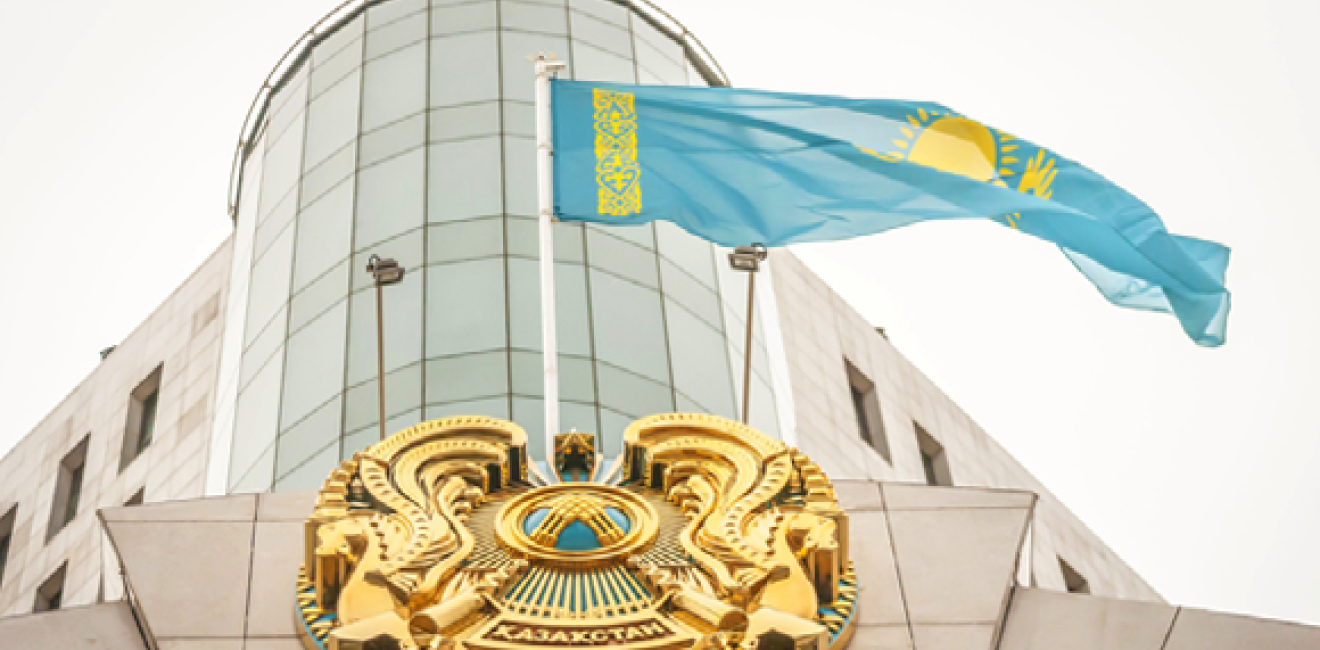
A blog of the Africa Program
The study of the relations between African states and the rest of the world tends to focus on the "usual suspects," meaning global powers such as China, Russia, and the United States. Relations with blocs like the European Union are also studied. Similarly, countries like France and Portugal (given their colonial past) continue to have strong, if controversial, relations with several African nations, while India, and Turkey have in recent years increased their diplomatic and commercial activities. Moreover, other states are looking to create and develop a relationship with African nations and have carried out interesting initiatives in recent years. One example is Kazakhstan.
Kazakhstan has embassies in Egypt, Ethiopia, Morocco, and South Africa. While this number is not particularly large considering that there are 54 countries on the African continent, it is also worth noting that Kazakhstan is a geographically distant and still relatively young nation, having achieved its independence from the Soviet Union in 1991. Moreover, Nur-Sultan has more embassies on the continent than any other Central Asian state — Tajikistan and Uzbekistan have embassies in Egypt alone, while Kyrgyzstan and Turkmenistan do not have any representation in Africa at all. On the other hand, only Egypt, Morocco, and South Africa have embassies in Kazakhstan.
South Africa is where we find the most interesting and noteworthy bilateral ventures between Kazakhstan and an African state. South Africa's defense industry is well-known; thus, it is no surprise that Nur-Sultan saw South Africa as an excellent option for defense cooperation. Specifically, the South African defense company Paramount Group and Kazakhstan Engineering teamed up to create a joint venture called Kazakhstan Paramount Engineering (KPE). The crown jewel of this partnership is the Barys 8X8 infantry combat vehicle (ICV). In 2021, the Barys (which means "snow leopard" in Kazakhstani) completed four years of trials throughout southern Kazakhstan and "across the forested and savannah-like steppe and the salt marshes of central Kazakhstan [and] the sands of Mangistau, near the Caspian Sea, covering a total distance of 25,000 km."
In November 2021, the defense news and analysis company Janes reported that PKE commenced the construction of Barys for Kazakhstan's special forces. It is unclear if Barys will be ordered by South Africa for its armed forces, but it stands to reason that both companies are looking to not only manufacture Barys for local forces, but will also look for international clients. It would be quite significant if, in the near future, other African militaries utilize an armored vehicle that was constructed in Kazakhstan.
Regarding Egypt, there are reports that Kazakhstan is looking to team up to create a food hub that can supply grain and other food products to Africa. According to BNN Bloomberg, the Egyptian Ministry of Agriculture plans to have Ain Sokhna port become a "logistical zone for free trade," that would help Kazakhstan "ship its grains and other foodstuffs to Africa." Nevertheless, the publicly-disclosed information about this project is still too scarce to fully understand its complexities and objectives. It is unclear when this "food hub" will start operating if any additional infrastructure will be built, and which will be the first nations in Africa that will benefit from greater access to Kazakhstani food products.
Nur-Sultan and Cairo have strong bilateral relations in other areas as well. In April, the Egyptian Minister of Finance, Mohamed Maait met with the Kazakhstani ambassador to Egypt, Khairat Lama Sharif, to discuss economic relations and promote more investment. More recently, Kazakhstan's Deputy Minister of Foreign Affairs, Adil Tursunov, met with the Egyptian Ambassador to Kazakhstan, Manal el Shennawi, in mid-May to discuss how to improve bilateral relations.
Relations with Morocco are still quite young, hence there is an opportunity for growth, as Morocco just opened its embassy in Nur-Sultan in 2016, 25 years after diplomatic relations were established. Kazakhstan opened its embassy in Rabat in 2021, with the first ambassador, Saulekul Sailaukyzy, presenting her Letters of Credence to His Majesty King Mohammed VI this past January. According to the Kazakhstani Ministry of Foreign Affairs, bilateral trade from January-November 2021 reached $103 million.
As for Ethiopia, the country is the location of the headquarters of the African Union, thus it makes sense for Kazakhstan to have an embassy there. Barlybay Sadykov, current Kazakhstani ambassador to Ethiopia is also the Permanent Representative of Kazakhstan to the African Union. This strategic location allows the mission to develop relations with other African states. For example, in late April, Mr. Sadykov met with the Ambassador of the Republic of Seychelles to Ethiopia, Conrad Mederic, to discuss potential areas of cooperation.
With that said, the future of Africa-Kazakhstan relations looks less promising for other African states. Trade does exist but it is not large — goods that Kazakhstan exports from African nations are mainly cocoa beans, tobacco, tea, and clothes, from countries including Angola, Benin, Kenya, Senegal, and South Africa.
Moreover, academic or other types of analyses about this topic are very scarce. An online search of English-language open sources carried out by the author resulted in only a few reports and commentaries. A 2015 commentary by the South Africa-based Institute for Global Dialogue argued that "Although there has been a substantial amount of publications that have commended this relationship, it is time to take a step forward and be mindful of romanticizing the relationship without seeing the desired outcomes." The Kazakhstani media has similarly published occasional commentaries about Kazakhstan-Africa ties, which also acknowledge the limited development of ties so far. A commentary by The Astana Times also published in 2015, explains how "Kazakhstan's trade with Africa has been small to date, a situation that it is determined to rectify." An analysis of Kazakhstani and Russian-language websites shows mostly announcements of new trade agreements or the establishment of diplomatic relations (e.g., between Kazakhstan and Liberia in 2016), though a 2021 research essay discusses the relations between Kazakhstan and North African states.
As for the future, it is unlikely that Nur-Sultan will establish new embassies on the continent unless major developments occur. The author has been unable to find any high-level delegations that traveled from Africa to Kazakhstan or vice-versa, apart from the presence of African companies at Expo-2017. Perhaps representatives from Kazakhstan and certain African states could meet at major international forums like the United Nations General Assembly to discuss new initiatives and topics of common interest.
There are certainly plenty of areas of cooperation where trade can flourish between the African continent and Kazakhstan, but long-term foresight and planning are necessary. Moreover, African governments as well as Nur-Sultan have to start looking at the other side as a potential key partner. The Barys project with South Africa and ongoing discussions about a "food hub" in Egypt for Kazakhstani products are good examples. If this "food hub" project works, it would provide many African nations with another supplier of critical products — for example, Egypt is procuring wheat from India, while Nigeria aims to obtain Canadian potash to replace Russia as a supplier of this fertilizer.
Global powers or extra-hemispheric regional powers like Turkey are very active in Africa, but it is also important to remember that even countries with a limited footprint across the continent have their own diplomatic, economic, and even defense strategies and objectives. While Kazakhstan will not become the main trade partner or defense ally of any African state in the foreseeable future, Nur-Sultan's initiatives so far among several African states (particularly Egypt and South Africa) should not be overlooked.
Wilder Alejandro Sánchez is an analyst that monitors defense, security, geopolitical, and trade issues across the Western Hemisphere and post-Soviet regions. He is the president of Second Floor Strategies, a consulting company headquartered in Washington D.C.
Photo credit: Flag of Kazakhstan and coat of arms over the main entrance to the Kazakhstan Senate building in downtown Astana, the capital of Kazakhstan by Roman Yanushevsky/Shutterstock.com
The opinions expressed on this blog are solely those of the authors. They do not reflect the views of the Wilson Center or those of the Carnegie Corporation of New York. The Wilson Center's Africa Program provides a safe space for various perspectives to be shared and discussed on critical issues of importance to both Africa and the United States.
Author


Africa Program
The Africa Program works to address the most critical issues facing Africa and US-Africa relations, build mutually beneficial US-Africa relations, and enhance knowledge and understanding about Africa in the United States. The Program achieves its mission through in-depth research and analyses, public discussion, working groups, and briefings that bring together policymakers, practitioners, and subject matter experts to analyze and offer practical options for tackling key challenges in Africa and in US-Africa relations. Read more

Explore More in Africa Up Close
Browse Africa Up Close
The Innovative Landscape of African Sovereign Wealth Funds



